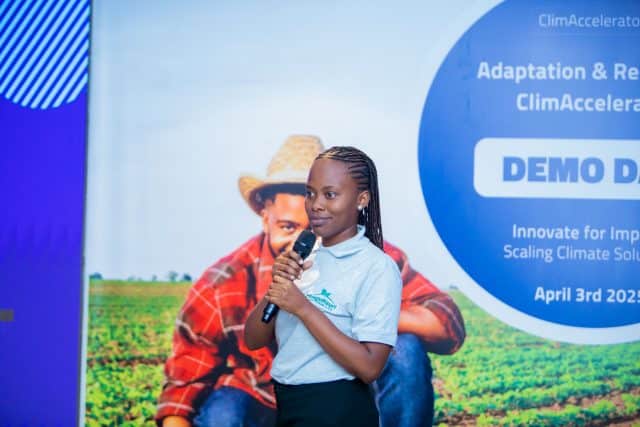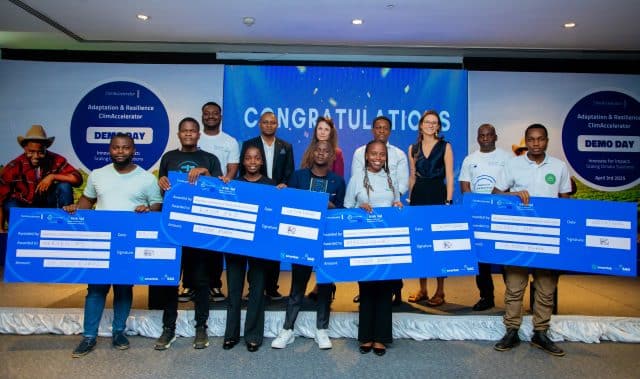tanzanian Start-ups Win Funding too Combat Climate Change Impacts on Rural Communities
Four ventures receive €10,000 each to test innovative solutions for climate resilience.
Published: April 25,2025
DAR ES SALAAM,Tanzania – Four start-ups have emerged as winners of the 2025 Adaptation and Resilience ClimAccelerator in Tanzania,a program spearheaded by SmartLab and Climate KIC. This initiative aims to shield rural communities and their ways of life from the escalating effects of climate change. From the ten participating ventures, HerVEG.05, InsectUp, Mbegu Nzuri Biotech Farms Ltd, and Rada 360 distinguished themselves with innovative solutions and were awarded the chance to advance to the next phase.Each will receive €10,000 to support growth and facilitate real-world testing of their climate resilience solutions.
Tanzania, like many nations across Africa, is grappling with the intensifying challenges of climate change. Rural communities and smallholder farmers are particularly at risk, facing unpredictable weather patterns, prolonged droughts, and other climate-related shocks.To combat these threats, innovative solutions are essential for helping these communities adapt to the changing surroundings and build resilience against future impacts.
ClimAccelerator Focuses on Adaptation and Resilience
The Adaptation and Resilience ClimAccelerator program supported ten promising start-ups, each addressing climate adaptation and resilience across various sectors. These ventures are driving high-impact solutions to protect people and livelihoods. The program offers expert support and valuable connections with investors and industry leaders to strengthen their climate-focused innovations.
A key component of the program was the Adaptation and Resilience Innovation Assessment and Validation Process, developed by Climate KIC. This rigorous framework provides start-ups with the tools to measure, validate, and communicate the impact of their climate solutions to potential investors. Through structured assessments, expert-led validation, and investor-ready credentials, start-ups can strengthen their market positioning, ensuring their solutions not only innovate but also deliver tangible climate resilience benefits in Tanzania.

Demo Day Highlights Innovative Solutions
The program culminated in a Demo Day held this month at the Hyatt Regency in Dar es Salaam. Participating start-ups presented their solutions to a panel of judges. After careful evaluation of each solution’s adaptation and resilience potential, HerVEG.05,InsectUp,Mbegu Nzuri Biotech Farms Ltd,and Rada 360 were selected as the winners. These teams distinguished themselves through their innovative approaches, commitment to community engagement, and the proven potential of their solutions to enhance climate resilience in rural Tanzania.

The exposure to new technologies from other participants and the mentors’ approach was eye-opening. One mentor’s presentation completely transformed my thinking about my business. I also gained valuable insights on defining and refining business models—an area I hadn’t deeply considered before.
Crescentia Mushobozi, founder, Mbegu Nzuri
meet The Winning Start-ups
- HerVEG.05: A nutrition-focused start-up working to improve food security in rural areas by promoting the cultivation of climate-kind, nutrient-rich vegetables. Their approach helps diversify food sources while teaching climate-smart agricultural practices to women and vulnerable communities.
- insectup: A circular economy solution transforming organic waste into high-quality insect protein for animal feed and lasting food systems through engineering of black soldier flies. By creating alternative protein sources, thay’re building resilience in the food chain while reducing waste and environmental impact.
- Mbegu Nzuri Biotech Farms Ltd: A biotech venture increasing access to climate-resilient seeds to support agricultural sustainability. Their drought-tolerant and pest-resistant seed varieties help farmers maintain productivity despite increasingly challenging growing conditions.
- Rada 360: A weather alert and advisory platform helping farmers make timely, informed decisions in the face of unpredictable climate conditions. Their solution provides localized climate data and agricultural recommendations directly to smallholder farmers, empowering them to adapt their farming practices to changing weather patterns.

Real-World Testing and Future Opportunities
the four selected ventures will receive continued support through real-world testing with rural communities.This crucial phase will bring their innovations directly to the field, allowing them to gather feedback, test solutions in actual conditions, and engage with key stakeholders, including rural communities.
This real-world testing phase offers several benefits:
- Enables start-ups to implement their solutions in practical environments.
- Collects valuable user feedback.
- Demonstrates measurable impact.
- Builds investor confidence through market validation.
- Refines their business models based on community input.
As alumni of the ClimAccelerator, these start-ups will gain additional advantages, including opportunities to showcase their solutions at international conferences and access to Climate KIC and SmartLab’s extensive networks. In addition, they can participate in ongoing training through the Adaptation Innovation Cluster in Tanzania, which is pioneering entrepreneurship that strengthens climate resilience of rural populations across the country. By supporting innovations specifically designed for communities most affected by climate change, the program ensures that solutions address real challenges faced by vulnerable populations.
This marks the second cohort of start-ups supported through the Tanzania Adaptation and Resilience ClimAccelerator, building on the program’s commitment to fostering climate innovation in the region.

Climate Change Impact on Tanzania
Tanzania faces significant challenges from climate change, impacting its economy, agriculture, and natural resources.Efforts to mitigate these effects are crucial for sustainable advancement.
| Climate Impact | Description | Potential Mitigation Strategies |
|---|---|---|
| Increased Temperatures | Rising average temperatures leading to heat stress in crops and livestock. | Promote heat-resistant crop varieties, improve irrigation techniques, and provide shade for livestock. |
| Erratic Rainfall | Unpredictable rainfall patterns causing droughts and floods. | Implement water harvesting techniques, promote drought-resistant crops, and improve flood early warning systems. |
| Sea Level Rise | Coastal erosion and saltwater intrusion affecting coastal communities and ecosystems. | Construct coastal defenses (e.g., seawalls), relocate vulnerable populations, and restore mangrove forests. |
| Deforestation | Loss of forests exacerbating climate change impacts and reducing biodiversity. | Implement sustainable forestry practices, promote reforestation efforts, and enforce strict regulations against illegal logging. |







